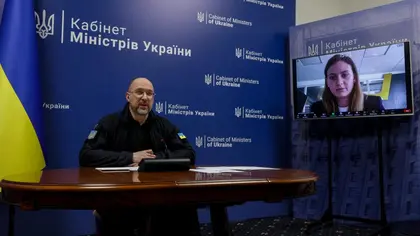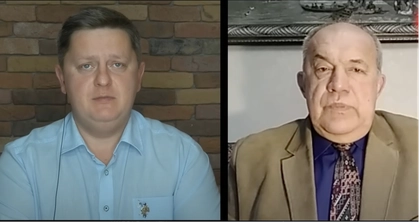Ukraine’s future accession to the bloc will bring more benefits than costs, and EU member states should approve the next formal steps later this week, the country’s Prime Minister Denys Shmyhal told Euractiv.
“We are waiting and wishing to have approval by the European Council at their closest meeting [this week], and believe we can begin accession negotiations in the first half of this year,” Shmyhal said.
JOIN US ON TELEGRAM
Follow our coverage of the war on the @Kyivpost_official.
His comments came after the European Commission sent its draft negotiating framework for Ukraine’s and Moldova’s accession talks to member states last week, following a decision by EU leaders in December.
“We hope that our European partners will approve it without any additional amendments as the European Commission proposes,” Ukraine’s prime minister said.
“[European Council] President Charles Michel named 2030 a possible target year for further EU enlargement, but we will do our best for Ukraine that it could happen earlier, immediately after our victory,” Shmyhal said.
Further adding, “We will execute our homework in a very fast way – I believe that it will take us not more than two years.”
‘More benefit than cost’
Asked whether he is worried his country’s bid could become a cost-benefit calculation for some of the more reluctant EU member states, Shmyhal said, “Ukraine will bring to the EU much more than the process of joining will cost.”

Special Ops Recruiters Provided a Unique Christmas Greeting to Ukraine
Some EU member states have argued that the bloc must reform itself first before considering adding more members, raising fears that this could be used to delay any progress in bringing Ukraine and others closer.
A recent report by the Bruegel think tank, as well as internal EU documents seen by Euractiv, estimate the financial cost of Ukraine’s accession to be between €110 – €136 billion to the EU seven-year budget, roughly 0.10%- 0.13% of the bloc’s GDP.
“We’ve seen the reports, but the Ukrainian market, the Ukrainian Defence Forces, the Ukrainian raw and critical materials, and other sectors could bring much more in terms of security and economic benefits,” said Shmyhal.
“We may go through a tough negotiation process, but we are ready for compromises based on mutual setbacks – but if we take a look at this as an investment project, it could be much more beneficial [for the EU] than [our] cost of joining.”
Asked whether he would be worried that certain EU member states, such as Hungary, would aim to slow down the process over bilateral issues, Shmyhal added:
“Disputes can be solved throughout the negotiations during the two-year process.”
Five key sectors
Speaking about what Ukraine would bring to the table as a future EU member, Shmyhal highlighted five sectors – defence, energy, agriculture, raw materials and digital – in which Kyiv hopes to make a case for itself.
“Look at our defence and military sector – Ukraine is a hub of military and defence technologies, produces new high-tech equipment, and we have the potential to be the European Shield, the European Arsenal and strengthen the defence capacities of the EU,” said Shmyhal.
Since the start of Russia’s war, Ukraine has developed a wartime drone industry, with plans to produce more of its own ammunition and key weapons systems domestically in the long term.
The European Commission, earlier this month in a sign that it wants to tap into those capacities, pitched the idea that Ukraine become a full member of the EU’s defence industry support scheme.
“We now have one of the strongest military defence forces in the world, with many – real – years of experience on the battlefield – this can strengthen the European defence system,” Shmyhal pointed out.
Ukraine could be an energy hub and “gas safe” for Europe, Shmyhal suggested, adding his country could “bring stability and more capacities, both economic and energy capacity” to the EU.
“We survived through two very difficult winters when Russia terrorised our energy infrastructure, but we still have a surplus in our energy system, and we may supply clean green energy to the European market,” said Shmyhal.
“We have one of the biggest on the continent, underground gas storages, on Ukrainian territory, 33 billion cubic metres, in very secure conditions, which many European companies already use right now.”
“We could increase this capacity for them up to 10-15 billion cubic metres,” he added.
Shmyhal stressed that Ukraine could also “bring more stability to the global food market, and with us, the EU could be a strong geopolitical player when it comes to food stability and security in the world.”
Ukraine’s prime minister dismissed concerns that some EU member states might want slow progress due to current concerns over the allegation of unfair trade practices.
“We have no intention of creating unfair competition with our neighbours, European countries and the European farmers,” said Shmyhal.
“This is why we ask the European Commission to open the negotiation process with the agricultural [chapter], to speed up aligning the rules and regulations.”
He added Kyiv would be ready to compete under EU rules and be “ready for communication, for negotiations and for compromises.”
“This will bring to all of us an absolute clear understanding that Ukraine doesn’t harm any European farmer,” said Shmyhal.
He pointed out that only 5% of his country’s agricultural production is currently transiting through Poland and neighbouring countries. Instead, more than 90% of Ukrainian agricultural exports would go through the Black Sea corridor.
Kyiv also proposed to Poland, Romania, and Slovakia to open the possibility of joint customs on border control points and to exchange databases for more transparent shared statistics.
Further, Kyiv looks to develop with European investors the production and processing of raw materials and natural resources.
Ukraine holds 5% of the world’s raw materials and natural resources, including 22 of the 30 critical raw materials crucial for European production, such as lithium, cobalt and titanium.
“We [also] have very good technologies for cyber protection due to our hybrid war with Russia which could be useful for the EU to increase security and stability in cyber protection in the digital sphere,” said Shmyhal.
Highlighting that Ukraine also plans to expand its infrastructure from the Black Sea to the Baltics and participate in the Rail Baltica project.
“Besides, European integration has already happened, [with Ukrainians] living and working inside the bloc according to European rules and values,” said Shmyhal, adding the bloc “should take steps to legalise this integration” by starting the formal accession process.
‘Point of no return’
EU leaders are expected to discuss further long-term military aid to Kyiv and will hold a strategic debate on what trajectory they see for Russia’s war in Ukraine.
“We are passing through [a] point of no return,” Shmyhal said when asked about his assessment of the current situation.
Further adding that “not a single country will remain unaffected” should there be no just outcome of the war.
“[Russia’s President Vladimir] Putin counts on the erosion of our unity – we should disappoint him, and we should be united as long as needed to win this war,” said Shmyhal, stressing the need to “save the unity of the EU, inside of Ukraine and inside of EU member states.”
You can also highlight the text and press Ctrl + Enter






